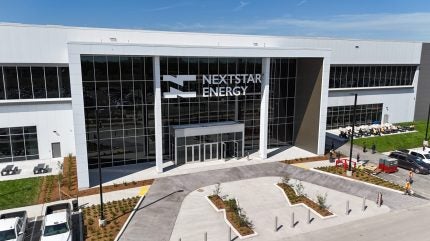
NextStar Energy (NSE), a Canadian electric vehicle (EV) battery manufacturing joint venture (JV) between South Korea’s LG Energy Solution Ltd (LGES) and Stellantis, has obtained the occupancy permit for its EV battery manufacturing plant in Windsor, Ontario.
The permit represents the completion of construction for the C$5bn ($3.5bn) facility, paving the way for the commencement of cell manufacturing operations within the year.

Discover B2B Marketing That Performs
Combine business intelligence and editorial excellence to reach engaged professionals across 36 leading media platforms.
NSE CEO Danies Lee said: “This achievement is the direct result of a shared vision, effective partnership, and incredible hard work of everyone involved.
“As we transition from construction to operations, I am deeply grateful for the collaboration between our partner companies LG Energy Solution and Stellantis, our construction partner Alberici-Barton Malow, the City of Windsor, the provincial and federal governments, and all who have supported our project to be completed safely and on schedule.”
In 2022, Stellantis partnered with LGES to create the inaugural EV battery manufacturing plant in Canada.
The JV is poised to produce lithium-ion battery cells and modules to support a substantial share of Stellantis’ vehicle production needs in North America.
The construction of the 4.23 million ft² plant started in the same year.
In 2023, the parties finalised an agreement with the Canadian federal and provincial governments regarding subsidies for the Ontario-based plant.
Last year, NSE began assembly of battery modules at the plant.
With an annual production capacity of up to 49.5 gigawatt hours, the NextStar Energy facility is said to be equipped for core operations including electrode production, cell formation and assembly, and module assembly.
The company said that it has employed over 950 full-time staff and is committed to generating 2,500 local jobs.
The site now hosts 11 buildings, encompassing two main manufacturing facilities for cells and modules, alongside nine support buildings such as a recycling centre and a safety testing laboratory.
While minor construction work is still underway in areas not yet operational, the facility is “fully approved for safe occupancy and ready for production.”
Windsor mayor Drew Dilkens said: “The C$5bn investment has placed us at the forefront of electrification, and our collective commitment to collaboration, land development, infrastructure, and job creation continues to drive new investments and build the foundation of future growth and development for Windsor and Essex County.”






